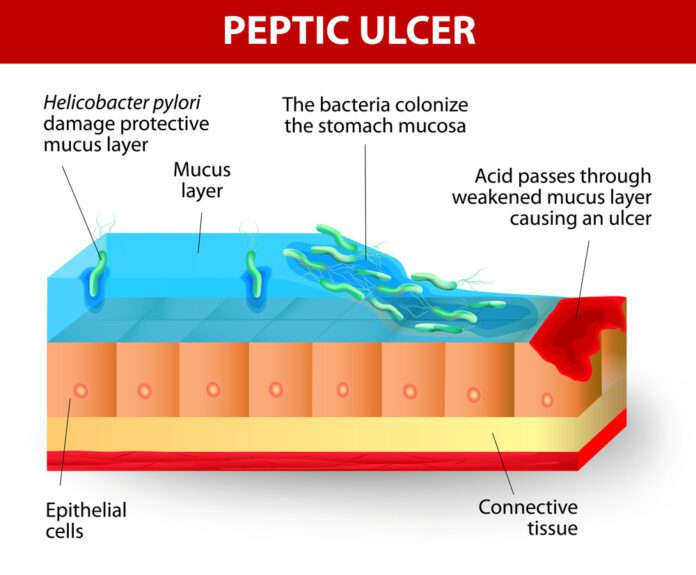Overview Of Ulcer, Peptic
A peptic ulcer is an open sore in the lining of the stomach or intestine.
There are two types of peptic ulcers; Duodenal ulcers, which occur in the first part of the small intestine, and Gastric ulcers, which occur in the stomach.
Causes Of Ulcer, Peptic
A bacteria called Helicobacter pylori (H pylori) is the most common cause of ulcers. The linings of the stomach and small intestines usually protect themselves against strong stomach acids.
But breakdowns in the lining may result in an ulcer, which mostly occurs in the first layer of the inner lining. Breakdowns may also result in Gastritis, which is the swelling and inflammation of tissue.
The following factors increase the risk for peptic ulcers:
- Drinking too much alcohol
- Stress
- Severe illness
- Regular use of ibuprofen, aspirin, naproxen, or other nonsteroidal anti-inflammatory drugs (NSAIDs)
- Radiation treatment
- Smoking or chewing tobacco
- A rare condition called Zollinger-Ellison syndrome
Symptoms Of Ulcer, Peptic
Abdominal pain is a common symptom of ulcers though pain levels differ from person to person.
Pain from ulcers also occurs on an empty stomach, often 1 to 3 hours after a meal. Some ulcers can also cause serious bleeding.
Other symptoms include:
- Problems drinking fluids
- Vomiting
- Nausea
- Fatigue
- Chest pains
- Ongoing heartburn
- Bloody or dark, tarry stools
- Vomiting
- Weight loss
To detect an ulcer, you may need an upper endoscopy (EGD).
This test checks the lining of the food pipe, stomach, and first part of the small intestine. It is carried out with a small camera (flexible endoscope) that is inserted down the throat.
A smaller endoscope is sometimes used for the test by passing through the nose into the stomach.
Treatment
Recommend treatment for ulcers include:
- Killing the H pylori bacteria, if it is present.
- Reducing acid levels in the stomach by using H2 blockers such as ranitidine (Zantac), or a proton pump inhibitor (PPI) such as pantoprozole.
- Lifestyle changes.
To treat a peptic ulcer caused by an H pylori infection, you need different combinations of the following medication for 7 to 14 days:
- Two different antibiotics to kill the H pylori bacteria.
- PPIs such as lansoprazole (Prevacid), omeprazole (Prilosec) or esomeprazole (Nexium).
- Bismuth (the main ingredient in Pepto-Bismol) can also be added to help kill the bacteria.
You will need to take a PPI for 8 weeks if:
- Your ulcer occured without an H pylori infection.
- Taking aspirin or NSAIDs caused your ulcer.
Other medicines used for ulcers are:
- Misoprostol to prevent ulcers in people who take NSAIDs on a regular basis.
- Medication like sucralfate, that protect the tissue lining.
An EGD may be needed if a peptic ulcer bleeds a lot.
Injecting the ulcer with medicine and using metal clips or heat therapy on the ulcer can help stop the bleeding.
Surgery may be needed if:
- The EGD does not stop bleeding.
- The ulcer results in a tear.



